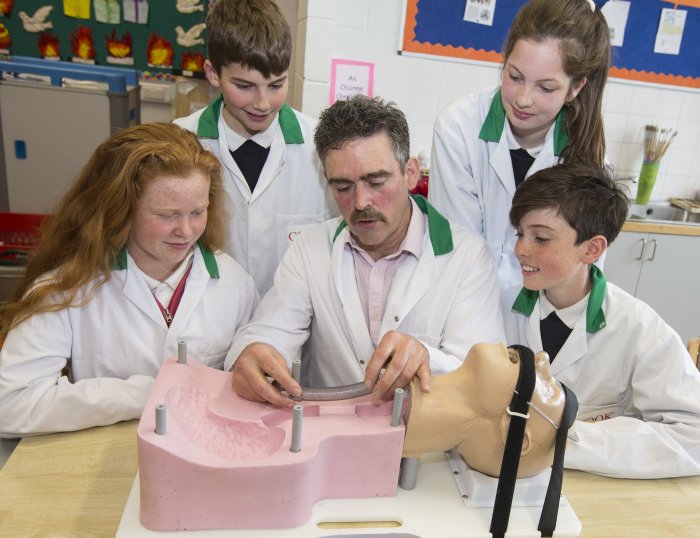
MedTech sector to help students realise their engineering potential
- Cook Medical senior engineers visit Castletroy Gaelscoil to talk about careers in Ireland’s medical technology sector ahead of MedTech Week, 19-23 June 2017
- Speaking today, Alice O’Dwyer, Vice President of HR at Cook Medical in Limerick says: “Collaboration between industry, educators and Government is crucial to ensure Irish graduates have the necessary skills to take up jobs in this sector in the years ahead.”
Cook Medical engineers from the company’s Irish headquarters in Limerick visited Castletroy Gaelscoil (Gaelscoil Chaladh an Treoigh) recently to give students an insight into what it’s like to work in Ireland’s medical technology sector. Students from 6th class had the opportunity to ask what a day in the life of a Cook Medical engineer is like and see first-hand a demonstration on how an oesophageal stent is used in medical procedures.
Speaking ahead of MedTech Week, a pan-EU initiative designed to promote and showcase innovations and research in MedTech, Cook Medical’s Darach McGrath, Director of Engineering for Cook Ireland said:
“Currently about 5,000 pupils sit the Leaving Cert engineering exam, a number which we believe is too low and needs to increase if we are to meet the demands for jobs in this area. We must put more focus on improving STEM education (Science, Technology, Engineering and Maths) in primary and secondary schools so children are adequately prepped for advanced technical study at higher level. The fields of engineering and technology are innovative and fast-moving and demand an equally innovative and fast-moving education system that is responsive to the demands of global industry.
We welcome the Government’s ambitious goal of establishing Ireland as a European leader in education and training by 2026, particularly its plans to increase the number of engineering apprenticeships and practical work experience opportunities for students*. It’s important to maintain this momentum. Going forward, deeper collaboration between industry and Government must be priority; not only to provide a best-in-class education system, but to ensure our graduates have the necessary skills to take up jobs in this sector.”
Cook Medical’s efforts highlight the need for more engineering curriculum as Ireland’s medical technology, or ‘MedTech’, sector is set to create 4,000 new jobs by 2020. Cook Medical already employs 850 people in Ireland.
The jobs surge, predicted in a recent industry report published by the Irish Medtech Association Skillnet and the Irish Medtech Association, will be driven primarily by increased investment in Ireland by international and indigenous companies setting up and expanding their operations.
Demand for engineers will increase, particularly as almost a third of all these new jobs will be in specialised areas, like R&D. Other advanced and relatively new skills, like 3D printing, robotics and data analytics, are also playing an increased role in the sector.
More than 29,000 people are employed in Ireland’s MedTech sector, a broad industry that produces more than half a million different products, from catheters to stents and pacemakers. It accounts for eight percent of Ireland’s total merchandise exports, worth €12.6 billion to the economy each year.
ENDS
